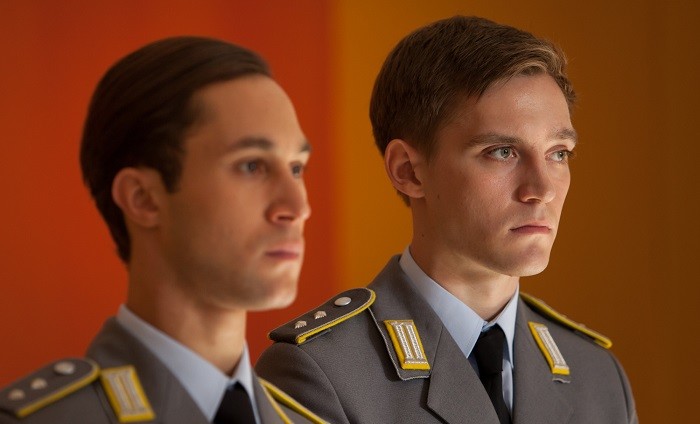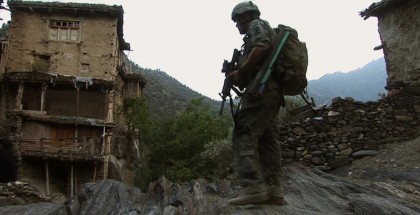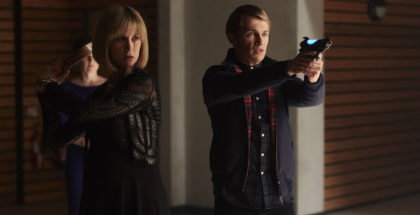Walter Presents TV review: Deutschland ’83 (spoilers)
Review Overview
Tone
7Style
9Personal politics
9Helen Archer | On 17, Apr 2016
Warning: This contains spoilers. For our spoiler-free look at the first few episodes of Deutschland ’83, click here. What is Walter Presents? Head this way for everything you need to know about All 4’s new VOD service.
In our initial review of the ratings-winner Deutschland ’83, based on the first two episodes, we asserted that there was no real feeling of foreboding, no real worry that anyone would die a gruesome death because they knew too much. This, it turns out, was rather optimistic, although it does point towards a tonal issue that is prevalent throughout the series.
This is an extremely enjoyable – and extremely popular – show. The first German drama to hit UK screens in many a year, critical acclaim abounded, with the consolidated figures for the first episode hitting 2.5 million. It turned out to be just up the British public’s alley, a heady mixture of nostalgia for a bygone era and modern production values gave us much to smile wryly about, as our hero Martin Rauch navigates a world where the walkman is a technological miracle and floppy discs are futuristic.
To recap: Rauch (played by the ultra-charismatic Jonas Nay) is given a new identity as Moritz Stamm and sent from east to west as a reluctant spy, leaving behind his (unbeknownst to him) pregnant girlfriend, and a mother in need of a kidney transplant, after being recruited by his Stasi agent aunt, Lenora (Maria Schrader). Martin is quickly taken into his new job as assistant to General Wolfgang Edel (Ulrich Noethen), and is also quickly taken into the bosom of Edel’s family, specifically by his son, Alex (Ludwig Trepte), and daughter, Yvonne (Lisa Tomaschewsky).
Mixing family drama with a high concept spy plot is key to the success of the series. Martin’s family, on the East side of the wall, has its own issues, although it seems a morally (and technologically) more innocent place than the West, where the Edel family are falling apart, due to differences in ideology across the generations. So, while Martin’s mother is deviating from her society, by collecting an impressive library of banned books, so Edel’s mother deviates, by having a nervous breakdown, brought on by the breakdown of her family; while east of the wall, Martin’s girlfriend Annett (Sonja Gerhardt) is doing her own dogmatically-driven informing, so to the west, Yvonne is dropping out by living in a commune, making folk music and taking part in peace protests. While Martin is busy being seduced by the trappings of all things West, so Alex is flirting with all things East.
Both Yvonne and Alex are uneasy with their father’s job and his politics. In one startling family argument, Alex tells his father that he is a Nazi, “just like (Alex’s) grandfather” – and with one sentence, brings up the spectre of World War II, and fills us in on a back-story which is not alluded to again, but stays with the viewer and has an indelible impact on all further action. Soon, Alex is in the arms of Tobias Tischbier (Alexander Beyer), a western professor and a friend of the East, and is offering his services to the Stasi, after being banished by his father.
By the middle of the series, things get increasingly dark. Rauch finds himself in the position of ‘Romeo spy’, wooing Linda (Nikola Kastner), the secretary of security analyst Herbert Mayer (Jens Albinus), in order to plant a bug in his office to gain access to the secrets it contains. Rauch has genuine feelings for Linda, but is obviously compromised, to the point where he is tempted to allow her to drown during a romantic swim in the lake (pretty much the only point at which the viewer is asked to question Martin’s own morality), and the next minute, after saving her, asks her to marry him. Yet the season reaches its darkest moments when Linda discovers his identity, and, running from him, is deliberately run down and killed, and Martin is left to bury her bloodied body in the woods. Soon after this, her boss, Meyer, after being blackmailed by the Stasi, kills himself – suddenly and shockingly.
From this point on, due to a series of crosses and double-crosses, the body count rises, yet the upbeat soundtrack (including tracks from Billy Idol, the Cure, and Queen) and beautifully shiny photography somewhat counteracts the fact that we are waist-deep in a morally dubious quagmire. The cold war anxieties, which lead to the climax of the series, are more of a backdrop during the final Able Archer episode than a serious point of tension, given that the viewer knows the outcome – there was, in the end, no nuclear attack, although the touch-and-go aspect is expertly done, with different egos and machismos fighting it out on each side of the wall.
In amongst all this, there are some decent action set-pieces, most notably a sequence which ends with Martin killing Carlos the Jackal after he bombs west Berlin. While the realist in you considers that if the security services were this basic, it’s little wonder the wall fell, the fantasist in you is willing to forgive all and just enjoy the ride. Yet, once more, darkness appears, with the shadow of the HIV virus and the ignorance surrounding it rearing its ugly head, bringing you back to a depressing reality with a firm bump.
None of these contradictions seem to have bothered the programme’s fans, however, and the series creators Anna and Jörg Winger are now busy developing two further series: Deutschland ’86 and Deutschland ’89. The jumps in time, in much the same format as the This is England series, will provide real-time backdrops to the continuing dramas of the Edels and the Rauchs, and it is their personal stories, rather than the political ones, which will have you coming back for more.
Deutschland 83, 86 and 89 are available on All 4.





















